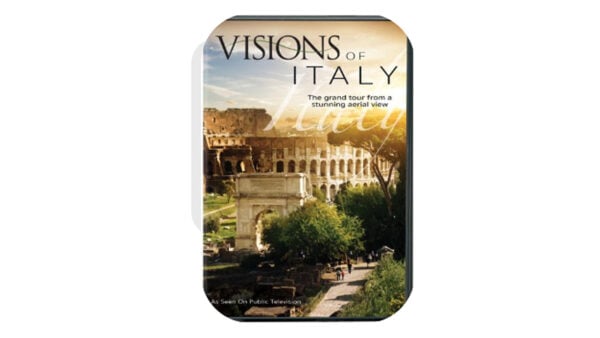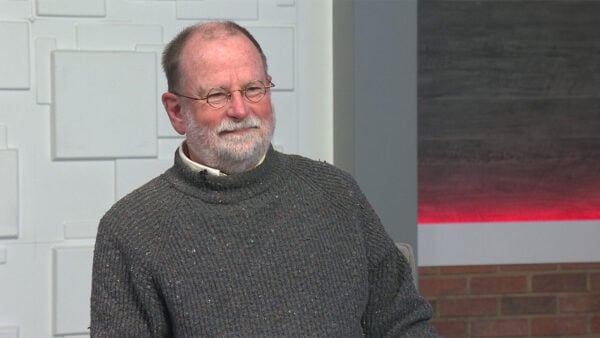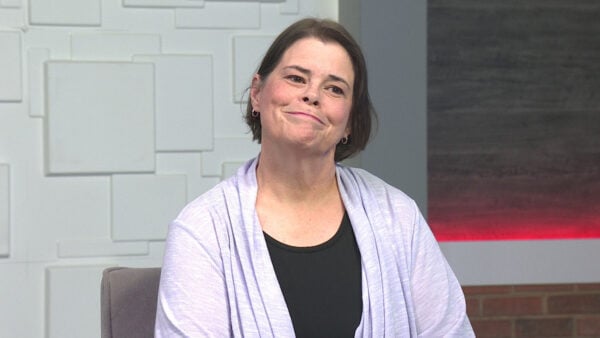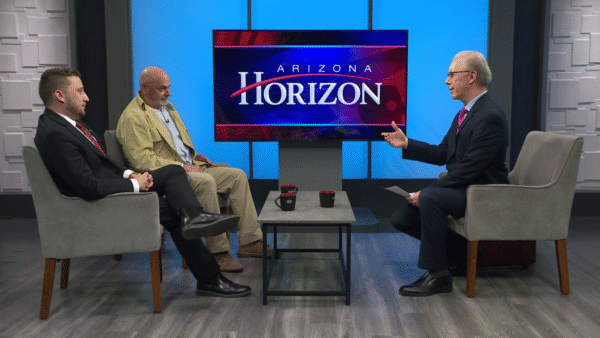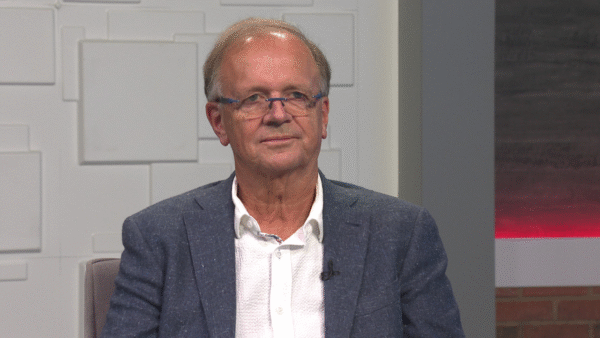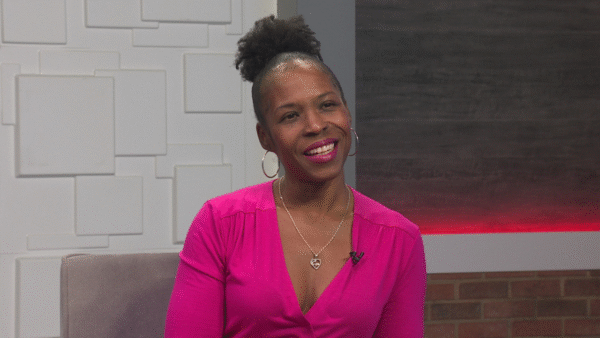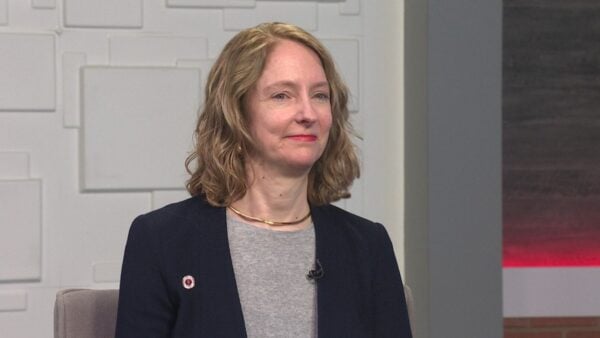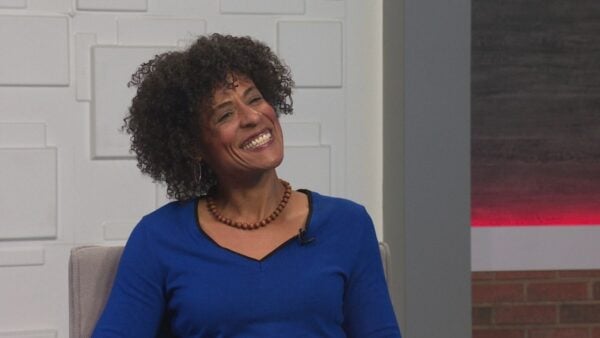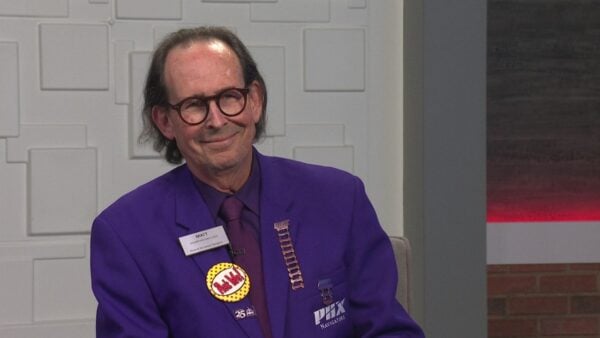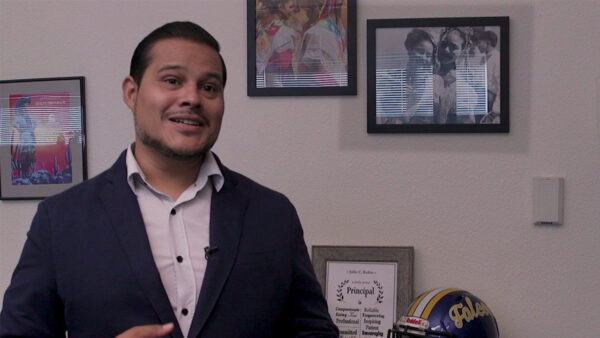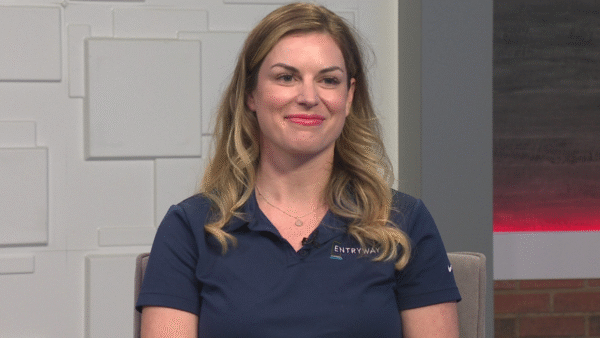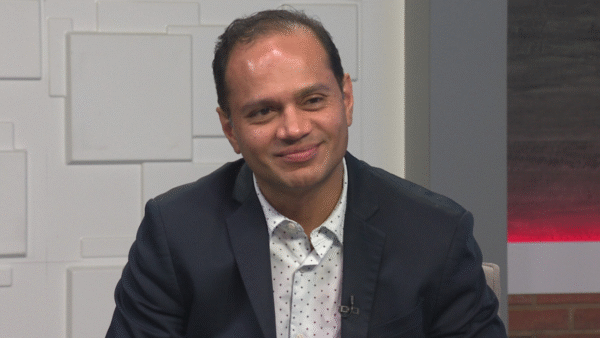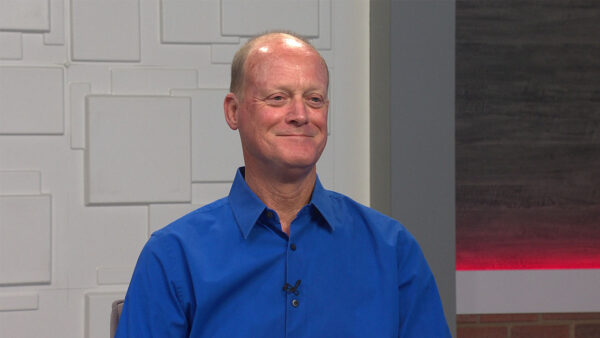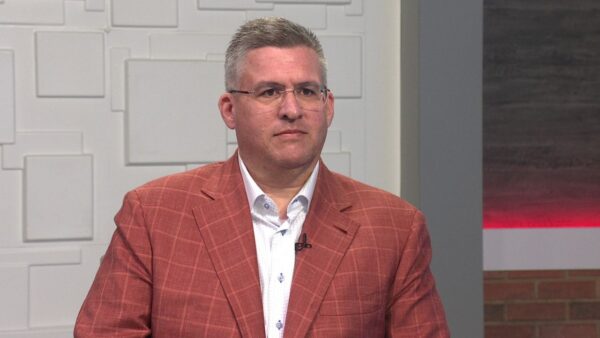Governor Janet Napolitano surprised some lawmakers Thursday when she vetoed a forest health bill. The State senate made changes to a proposed liquor bill that would block any new drive-through lanes at liquor stores and would prohibit tasting samples from being given out at stores. And because of soaring gas prices, Governor Napolitano wants the EPA to give Arizona a waiver on the use of summertime fuel.
>> Cary Pfeffer:
It's Friday, April 15th, 2005. In the headlines this week, Governor Janet Napolitano surprised some lawmakers Thursday when she vetoed a forest health bill. The State senate made changes to a proposed liquor bill that would block any new drive-through lanes at liquor stores and would prohibit tasting samples from being given out at stores. And because of soaring gas prices, Governor Napolitano wants the EPA to give Arizona a waiver on the use of summertime fuel. That's next on "Horizon."
>> Announcer:
"Horizon" is made possible by the friends of channel 8, members who provide financial support to this Arizona PBS station. Thank you.
>> Cary Pfeffer:
Good evening, I'm Cary Pfeffer in for Michael Grant, and this is the Journalists' Roundtable. Joining me to talk about these and other stories are Mary Jo Pitzl of the "Arizona Republic." Howie Fischer of the "Capitol Media Services." And Chip Scutari of the "Arizona Republic." It was a busy week for Governor Janet Napolitano as she decided the fate of several bills approved by the legislature. On Thursday, she surprised some by using her veto stamp on a forest health bill. Mary Jo, why did the Governor Mary Jo, this was the bill run through the legislature by a Democrat? It looked like it should be safe if you predict these things in general.
>> Mary Jo Pitzl:
Representative Cheryl Chase was the bill's sponsor, this bill picked up lots of pieces from I think three other pieces of forest legislation. It became an amalgamation of some of these other bills. Chase also helped to sponsor a forest health bill last session that she did sign although she acknowledged that that bill was useless in achieving what they want to do. The goal is to try to create incentives to get companies to come in and set upshop in Arizona's forests and cut down the little stuff, the smaller trees, the shrubs.
>> Cary Pfeffer:
As far as an economical standpoint from the forestry, they are not interested.
>> Mary Jo Pitzl:
Correct. That has not happened. There is a company that has a contract with the federal government up on the Apache Sitgreaves national forest to do just that, cut down the little stuff, they couldn't take advantage of any of the tax incentives that came out of the last legislative deal, so they made another run at it. This bill the Governor contends and the owner of the company contends they would not have benefited either.
>> Howard Fischer:
What's interesting is the lawmakers express surprise. I was sitting on the senate floor when the bill came up, and senator Gabrielle Gifford proposed an amendment and said you need these changes to get the Governor to sign it. No, no, no, we don't. She says if you don't change it will be vetoed. Then suddenly the Governor vetoes the bill. How could she do that? Duh, were you not listening in the first place?
>> Cary Pfeffer:
We should update team people on the overall process. We paid a lot of attention to this because the forests were burning. Is there progress being made?
>> Mary Jo Pitzl:
It's very slow progress. There are thousands of acres that need to be thinned in the forest. There is this effort just starting up, forest energy has a 10-year contract to cut down the little stuff. They will use it to produce heat for boilers and for various projects up on the rim.
>> Cary Pfeffer:
Kind ling almost.
>> Mary Jo Pitzl:
And other forests have been doing control burns, but the idea that you really want to boost this and that was the idea behind the tax incentives. In this bill that the Governor vetoed there were some tax incentives that would have cut the fuel tax, that you need trucks to haul this stuff away, trucks are heavy, they consume a lot of fuel, this would have saved them some money, anybody doing that. Senator flake who is the chairman of the senate natural resources and agriculture committee was outraged by the veto. She says this undercuts a lot of efforts starting up in the rim area. There is a lot of small companies that he says will go ahead and start their work anyway, but they came here with the idea that they were going to --
>> Cary Pfeffer:
with the understanding they would get a break.
>> Howard Fischer:
There are other things, aside from the gas tax break, the law passed last time said you need 10 full time employees. This cuts it to three. It would have cut back on the amount of insurance they had to offer.
>> Cary Pfeffer:
Or had to carry?
>> Howard Fischer:
No, that they had to offer their employees. In other words, in order to qualify, they want to make sure these were well-paying jobs and people were not going to end up on the Arizona healthcare cost containment system. Part of the veto dealt with the Governor's ego. The bill would have changed the reporting relationship. Right now the Governor is the state's representative on one side for the federal government and on the other side to the industry. This would have taken her out of that role. What part of that they didn't understand that the Governor was not going to be happy with, every Governor, Republican, Democrat, has protected his or her own powers. And that was a veto waiting to happen.
>> Cary Pfeffer:
All right, I think we've covered that. Let's talk about the pharmacy bill and the question that came up about pharmacists being able to on a matter of conscience decide that they didn't want to dispense certain pills. It seemed like it was, again, one of those situations where there was going to be opposition from the Governor. Talk about the atmosphere around this one.
>> Howard Fischer:
Well, what you have there are two separate issues. As you point out, this was dubbed the right of conscience. There are people who for religious or moral beliefs do not believe in abortion. What you are talking about here is really two pills, one is RU-46 although these are not handed out at pharmacies. The real issue here is the morning after pill. That's a massive dose of hormones, it's like taking three or four birth control pills. What causes the attention of the Catholic community, it can block ovulation, not a problem, but if there is a fertilized egg, it will block the egg from implanting. Pharmacists and others said simply dispensing the drug makes us a party to that. The Governor's position is okay, that's fine, but do we need legislation to say you can simply turn someone way? This is something between a woman and her doctor. If the doctor says to the woman, you should get the drug and the pharmacist, particularly in a rural area where you don't have a pharmacy on every corner like you do here says, I'm not going to dispense it, now you have a problem, particularly with the morning after pill, where the sooner you take it the more likely you are to prevent pregnancy.
>> Chip Scutari:
The politics of this is the social conservatives over the last two or three years are making inroads with certain bills. It was last year or year before, we had informed consent with the mandatory 24-hour waiting for an abortion, which the social conservatives know that the Governor would veto that.
>> Cary Pfeffer:
But this is the legislative version.
>> Chip Scutari:
Yeah, a lot of people thought it wouldn't make it to her desk, we're working on eliminating tax pen malt, but the social conservatives have done a good job of lobbying their bills to get her to her desk to get a veto on record.
>> Howard Fischer:
That's the point. This is political. They all knew she wasn't going to sign it, but with the 2006 election, they can use that against her.
>> Cary Pfeffer:
A quick update on the voting rights developments there.
>> Howard Fischer:
Two weeks ago we were sitting around this table. The Governor had vetoed that ledge Salt Lake City to allow professional ballots. Terry Goddard said you can't make that blanket thing because people show up without identification. So the bill went to the Governor said, if you are on the voter registration rolls, if you bring something else along, a utility bill, we'll let you vote a provisional ballot. You sign the outside of the envelope, they compare your signature on the envelope to what you have on file, and if it matches, only then is it counted. Well, the bill that went up to the Governor said, however, if you don't have this other ID, you can't vote. The Governor said that violates federal voting rights laws. What happened today is an assistant attorney general from the Department of Justice wrote back and said, well, yes, you are allowed to have provisional ballots but states can impose more strict requirements. The interesting question with this is, this was not signed by Steven Richards, the head of voting rights section, this was signed by somebody higher up in the political chain. The question was, was this a political opinion or a legal one.
>> Chip Scutari:
Tim Nelson, the Governor's legal counsel said today talking about this issue, what if you are on the way to the polls and you get mugged or you lose your wallet or, you know, we shouldn't be -- we should be able to count these votes. It's too important of a right in America to lose it over something like this.
>> Cary Pfeffer:
We will see were where that goes. One of the bills under consideration by state lawmakers is one that would make several changes to the state liquor laws. On Thursday the state senate rejected some of the proposed changes. Howie, let's talk about the ins and outs of this one.
>> Howard Fischer:
Well, what's in and what's out. What's out was a house passed provision that would have allowed sampling. Right now, with very few exceptions, if you go into a retail store, you can't say I'd like to try that particular line. This causes concern among the manufacturers of those $60-$70 bottles.
>> Chip Scutari:
Your red and white wine.
>> Howard Fischer:
Actually, we will talk about medical marijuana. You are not going to plunk down $60 for a bottle of wine on something that may taste like vinegar. This would allow one ounce of wine or three ounces of beer. This caught the attention of state senator Carolyn Allen who had been married to an alcoholic. She said you know, it's hard enough for these people to avoid it every day without going to fry's to have it right there. What happened is real interesting. Right now you are on your way home, you want a six-pack, you don't want to get out of the car, it's raining or something, you go through your favorite drive-through liquor store. Some people have decided, that's a little too easy, and they tagged a provision onto the bill to say in all future liquor stores you cannot build it with a drive-through window. You cannot take away what people have, but the moment they sell that to anybody but a family member, the window is shut forever. The industry is not happy. They want to make it very easy to buy beer, people like Gaby Gifford say well, it makes it easier to drive up and chug it there at the window, whether it contributes to drunk driving as opposed to having to rush into your Circle K to get it, hard to say.
>> Chip Scutari:
The other provision they yanked out of the bill was a controversial piece that would allow cities to put bars within 300 feet schools or churches. Charter schools pop up in different places and that was yanked out because the Governor made it known she was going to veto the bill.
>> Howard Fischer:
I like that you make it the other way. You should prohibit a bar within 300 feet of a bar. Bars pay taxes, schools don't.
>> Cary Pfeffer: Well, direct all letters to Howie Fischer. Mary Jo talk about the Department of Environmental Quality. It's okay, it's not, it's out there, it's in the target, it's not in the target. What's the latest.
>> Mary Jo Pitzl:
People are taking bets or rolling the roulette wheel to see how many years the department will be extended. This is up for a sunset review. This happens to all state agencies at some point in their existence. Lawmakers responded to industry concerns said this is a great chance to air complaints that we have with DEQ, and their complaints are specific to the somewhat new director Steve Owens, a Napolitano appointee. The senate approved a bill that would give them 10 years. It went to the house, house chairman Ray Barnes put it in his drawer and said I'm going to back 2 years. Now we're up to 4. That came out of the house. This is going to the senate.
>> Howard Fischer:
What's really fascinating --
>> Cary Pfeffer:
You do the math.
>> Howard Fischer:
What's really fascinating about this, is Ray Barnes unlike the senators trying to hold up the agency's budget said I don't have a problem with what DEQ is doing. He's hacked off because he sponsored bills for the agency, got them to the house, they go to the senate and the DEQ lobbyist had them amended. He throws a hissy fit. He said they have no respect for the legislature, they have no respect for division of powers, and so I'm going to teach them a lesson. That's what this is about. This has nothing to do with the policies of DEQ, with whether they are doing a good job with notices of violation. It has to do with Ray Barnes' ego.
>> Cary Pfeffer:
What's the final number?
>> Howard Fischer:
I think it's going to be four years. Everyone realizes that two years, you really can't give an agency a chance to be reviewed. 10 years isn't going to happen because lawmakers believe look, we are term limited out after 8 years, you can have a lawmaker come in, leave and never have a chance to review an agency. So 4 seems to be the thing that will stick.
>> Mary Jo Pitzl:
Even though DEQ has been on a two-year leash before, they forgot their vehicle emissions program was ready to lapse, lawmakers used that as an opportunity to put them on a two-year renewal. The agency also had a four or five year --
>> Chip Scutari:
does all of this fuss mean that Steve Owens is doing a good job?
>> Mary Jo Pitzl:
Some people look at it that way. The people in the possession of defending the agency say, heck, they are not doing enough. They are not being aggressive enough.
>> Howard Fischer:
And here's the other piece of the equation, which is, while the business community, many elements are unhappy, they recognize, you've got to be careful how hard you tread, because the alternative to a state agency in Phoenix is region 9 of the EPA in San Francisco. If you don't like dealing with somebody in Phoenix, you are going to hate dealing with EPA.
>> Mary Jo Pitzl:
And late last week, the regional administrator of EPA said he'll be coming to town in early may to check and see what he might have to take over if that's the case. But also, sort of laced throughout the EPA's comments, there is a great reticence on their part because they ain't got the money to do this, and they can't bill the state back for its services, so I'm not sure if EPA would be the big bad wolf that it is. There also appears to be a national trend in the state of Mississippi. Lawmakers did run a bill to do away with the agency and transfer its duties back to the EPA and do away with its budget. Last we checked they didn't have a budget because the legislature had adjourned without passing a budget.
>> Cary Pfeffer:
You always want to follow Mississippi's lead.
>> Mary Jo Pitzl:
Director Owen said we don't even have Mississippi to kick around anymore.
>> Cary Pfeffer:
Let's talk about junk food with the kids. This hits home for me.
>> Howard Fischer:
Chip understands junk food.
>> Chip Scutari:
I don't have my prop here. We've been talking about this bill for three years. High schools are now out of it, so little kids up to the 8th grade will eat nutritious foods, high schoolers can put in candy bars an Skittles and everything else in their mouth and hopefully this bill will be done pretty soon so we don't have to talk before it much longer.
>> Howard Fischer:
People talk about what is junk food and there are federal regulation that is talk about things that sugared sodas are junk food and jelly beans and such, but senator Dean Martin was talking on the floor of the senate, and he pulled out of his pocket a granola bar. He said okay this, granola bar has 150 calories and 8 grams of fat then he pulled out a thing of Skittles which had more calories and and less fat.
>> Cary Pfeffer:
Where is the definition?
>> Howard Fischer:
One person's junk food -- the Department of Education will have to craft something. Is there enough good things to make up with the fact that it's packed with lard.
>> Chip Scutari:
Teachers can still go to the teachers lounge but - Little johny is like I have to eat this nutritious food. What kind of example does that set for the kids.
>> Cary Pfeffer:
Let's talk about guns in bars. What's the progress or lack thereof as far as that's concerned?
>> Chip Scutari:
This has been a controversial issue for a couple of years in the capitol, especially in light of the Loren wade shooting a few weeks ago. House members approved the bill this week to allow what people call guns in bars. Supporters of the bar like to call it a Denny's bill. If you are at the shooting range and you want to have breakfast with your family or lunch, you can pack some heat while you're eating moons over Miami. So it'll be interesting to see if it makes it through the legislature what the Governor will do with this because of the pressure of the NRA. They keep saying hey, this isn't crazy although comedy central made fun of this bill. This is rational policy, bars and restaurants can post a sign if they don't want this happening in their establishment.
>> Howard Fischer:
They all brought up the Loren wade question so somebody pointed out excuse me, he wasn't shot in the bar, he was shot in the parking lot where there would be no restrictions. The NRA wanting the whole bill has given the Governor something to shoot at, two things, number one -- excuse the expression -- the fact is that you have to post to keep the guns out. You the second point is while as Chip points out it's called the Denny's bill, it means you can go into any biker bar on Indian School, also with a weapon, so we're not talking about somebody having, you know, the eggs and ham with the bacon --
>> Cary Pfeffer:
and the beer as well.
>> Howard Fischer:
Exactly. And that becomes the issue. I think, you know, I'd be willing to bet you lunch now that the Governor vetoes this puppy.
>> Mary Jo Pitzl:
It raises the question for the bar component of it, if a gun owner does drink, somehow is served alcohol, would the Bar be held liable.
>> Howard Fischer:
That becomes the question of if the person has the concealed weapons permit and there is no way for the bar owner to know. Although if the bar owner asks, are you packing,. Now if the person is carrying open, and the bar owner serves them, then liability is on the bar owner. This is filled with problems. This is not going to become law. We will not have to discuss this.
>> Chip Scutari:
It's comical. If this bill is on the floor calendar, they'll debate it for 40 minutes with Democrats saying it's silly and ridiculous and conservatives like Russ Sal Pearce saying it's a good thing. You can predict what they are going to say.
>> Howard Fischer:
There is one other point that people forget in this which works in the favor of the gun owners. People talk about the second amendment of the constitution which talks about the right of well regulated malicious to bear arms. Arizona's version says the right of people to arm themselves in defense of themselves and the state shall not be abridged. So from a pure state constitutional standpoint we have a broader protection for gun owners than they do under the federal constitution.
>> Cary Pfeffer:
And speaking of lethal weapons, let's talk about sparklers because that apparently in dealing with things that are of cutting edge --
>> Chip Scutari:
Don't you love our state legislature, they are tackling these big problems, sparklers, guns in bars, banning junk food for kids. How long has the sparkler thing been around. You've been down there 42 years, so --
>> Howard Fischer:
The funny think is, I've been at the legislature since '82, we had sparkler bills then. Arizona is one of only a handful of states that says anything that can explode, anything, is illegal. The only exception are caps. So for a variety of years, they have tried to get in little things. This bill started out as a bill for poppers, these little paper champagne bottles, you pull the string, a little bit of gun powder -- no, everyone has had them and used them and they are illegal.
>> Cary Pfeffer:
I've been breaking the law all this time.
>> Howard Fischer:
And I've been meaning to talk to you about that. So the industry says let's get the poppers legalized. Then Russell Pearce, being helpful said I'm going to legalize sparklers. Guess what, that amendment got on the bill, every fire chief I've spoken to in the state --
>> Cary Pfeffer:
That's an environmental issue. A dry summer, and it ends up becoming an issue.
>> Mary Jo Pitzl:
Timing is interesting because this year the expectation is that the biggest fire threat will come at the lower elevations and grasslands, i.e., in the urban areas where kids might be running around with sparklers. I'll wait and see what happens on July 4th. Keep your volunteer fire department nearby.
>> Cary Pfeffer:
Absolutely. All right. A few other things. There have been some hopes of having a budget agreement. In fact, it was specifically scheduled for today, but that agreement did not happen. It appears lawmakers are not close to a deal. Where are we? They were ambitious in setting that April date.
>> Chip Scutari:
Well, Howie and I don't know about a secret meeting tonight, they are not going to meet their April 15th deadline. This is the annual push and pull between the conservative legislature and our Democratic Governor. I think what's going to happen next week is when the bills come out, the Governor is going to get her wish on full-day kindergarten. She'll get the medical center in downtown Phoenix. There will be a business property tax cut, the whole sales Intel tax break will be worked out and maybe that might be a provision. It's always the little small things that muck up the budget negotiations. I think next week will be the week they get the budget done.
>> Howard Fischer:
You are right, a lot of them is small.
>> Chip Scutari:
You said I'm right?
>> Howard Fischer:
I know. I know. We'll mark it on the 15th of April at 20 after 7:00 in the evening, Chip Scutari was finally right. But they are funny little things. The Governor wants another million for her office. The senate gets a million bucks, issued get a million bucks. The Governor doesn't want to spend a million on abstinence programs. But there is one big thing out there, tuition tax credits. Vouchers are not going to happen this year. They can't get the bill out of the house. This becomes the next best thing. We have tuition tax credits for individuals who can deduct up to $500 for individuals and $625 for couples to give money to organizations to give scholarships to private parochial schools. That's up to $30 million a year. That's not a lot of money. They want to allow corporations to donate and get a dollar for dollar credit against what they owe the state. Now we're talking something up to $55 million a year for them. The Governor's position is leaving aside whether the state needs the $55 million is the question of should we allow state money to be diverted for parochial schools until we adequately fund public schools.
>> Chip Scutari:
School choice groups have been doing a lot of polling, and Hispanics, especially Spanish Catholics really love these corporate tuition tax credits because sometimes a Hispanic family will go to the Catholic school and the principal will say can you afford this, we'll get you some tax money, so it can be an interesting campaign issue next year in 2006 Governor's race.
>> Cary Pfeffer:
We will see what happens. Mary Jo, we'll give you the last word. There has been a discussion asking for a waiver. Where did that end up?
>> Mary Jo Pitzl:
The Governor's office was going to ask EPA, well, hey, how about letting us off of this special summer time fuel in the name of trying to save some money. The next day the Governor's office was saying, well, we weren't real serious about it, but I guess we'll ask our environmental agency to go down that path. EPA says they have never, ever granted a waiver on the basis of costs. That's not their concern, they are more about air quality. And the bigger picture is that if this valley does not meet the new ozone standards, it's got until 2009 to do that. If you don't, a lot more could be at stake.
>> Howard Fischer:
The other piece of that which the Governor sort of side stepped when we confronted her, let's assume we could save 10 cents a gallon there are reasons for the clean fuel. Ozone is an irritant. It causes problem to people with lung problems but can cause deaths. Why would you consider asking the oxygenates out of the fuel and allow more ozone in the air, just to save a few bucks a week on a tank of gas? That doesn't make any political sense.
>> Cary Pfeffer:
But those fuel prices certainly are going to continue to get people's attention.
>> Howard Fischer:
They will certainly do that, but again, is 10 cents a gallon going to make a difference if you are paying $2.39 for regular?
>> Mary Jo Pitzl:
This time around we haven't had calls from lawmakers, congressional panels, attorney general and Governor to explore why gas prices are so high. It seems to happen every time we go through one of these cycles.
>> Cary Pfeffer:
Well, as I said, Mary Jo you get the last word. We appreciate you being here. If you want to see a transcript of tonight's program, visit our web site, www.azpbs.org. When you get there click on the word "Horizon." That will lead you to transcripts, links and information on upcoming shows.
>> Announcer:
Watch Channel 8's "Horizon" for a week-long series examining the system, examining your kids, including controversy over standardized tests, new legislation that may bring four-year degrees to community colleges, recent proposals to revamp and reorganize the university system, and what's new with charter schools. Don't miss Arizona education report card, begins Monday, April 18th on channel 8's "Horizon."
>> Cary Pfeffer:
Howie, Chip, Mary Jo, thanks for being here. I'm Cary Pfeffer filling in for Michael Grant who will be back next week.
Mary Jo Pitzl:The Arizona Republic;







